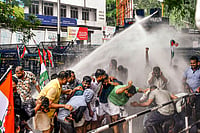Truth about Gyanvapi mosque, Taj Mahal and Krishna Janmabhoomi in Uttar Pradesh and all other disputed places in the country should come out before the people, senior RSS leader Indresh Kumar said on Sunday.
Speaking to reporters on the sidelines of an event here, he said the people want to know the truth about these places as they feel that it will help the country get "a right direction".
It's not out of any grudge against anybody or due to some politics that people want to know the truth of these places, he added.
"A discussion is going on about the Gyanvapi, Taj Mahal, Krishna Janmabhoomi and various other places in the country. Everyone wants to know the truth (about them). It's is not out of any grudge against anyone or due to some politics," the RSS leader told the reporters in response to their queries.
Common people feel that the more truth about these places comes out the more it will help the country get a right direction.
Kumar, who is RSS national executive member, appealed to the people to rise above their caste, community, region, religion, and party, and help the court bring out truth about "such disputes".
A court-mandated videography survey of the Gyanvapi Masjid complex in Varanasi was carried out peacefully for the second consecutive day on Sunday, with the major part of the exercise said to have been completed.
The survey, which was stalled last week amid objections by the mosque management committee, which claimed that the advocate commissioner appointed by the court for the survey did not have the mandate to film inside the premises, will continue on Monday.
The mosque is located close to the iconic Kashi Vishwanath temple and the local court is hearing a plea by a group of women seeking permission for daily prayers before the idols on its outer walls.
Earlier this week, however, the Allahabad High Court dismissed a plea seeking a ''fact-finding inquiry'' into the history of the Taj Mahal and the "opening of 22 rooms'' on the monument's premises, saying the petitioner failed to point out which of his legal or constitutional rights were being infringed.
The High Court recently directed expeditious hearing in the Shri Krishna Janmabhoomi-Shahi Idgah Masjid dispute. Two applications were filed last week in a Mathura court for an early appointment of a senior advocate commissioner for "verifying the presence of signs of a Hindu temple" at the mosque site so that they are not tampered with while the cases are decided legally.
The Lucknow bench of justices D K Upadhyay and Subhash Vidyarthi pulled up the lawyer of petitioner Rajneesh Singh, who is the media in-charge of the BJP's Ayodhya unit, for filing the PIL in a "casual" manner and said it cannot pass an order under Article 226 of the Constitution in the matter.
The article empowers a high court to issue to any person or authority in the area under its jurisdiction orders or writs to enforce the fundamental rights.
The bench said that it was a non-justiciable issue that cannot be decided or gone into by the court.
The bench said that the petitioner could not point out as to which of his legal or constitutional rights were being infringed.
Dismissing the plea as misconceived, the bench pulled up the petitioner's counsel Rudra Pratap Singh over and again for moving the PIL without properly conducting legal research work, and declined to intervene into factual issues as to what was behind the closed doors of the Taj.






.png?w=801&auto=format%2Ccompress&fit=max&format=webp&dpr=1.0)



















